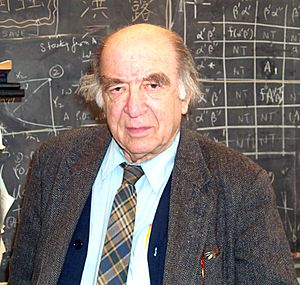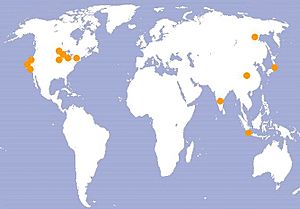Leonid Hurwicz facts for kids
Quick facts for kids
Leo Hurwicz
|
|
|---|---|
 |
|
| Born | August 21, 1917 |
| Died | June 24, 2008 (aged 90) |
| Nationality | |
| Awards | National Medal of Science (1990) |
Leonid Hurwicz (August 21, 1917 – June 24, 2008) was an American economist and mathematician. He won the 2007 Nobel Prize in Economics.
Hurwicz invented the economic sciences of incentive compatibility and mechanism design. International economy and trade is studied using the ideas Professor Hurwicz had.
Hurwicz worked as Regents Professor of Economics (head teacher of economics) at the University of Minnesota. Professor Hurwicz believed that game theory is very important. Hurwicz shared the 2007 Nobel Memorial Prize in Economic Sciences with Eric Maskin and Roger Myerson for their work on ways mechanism design.
Contents
Personal life
Professor Hurwicz was born in Moscow, Russia to a Jewish family a few months before the October Revolution. His family is Polish and had lived in Congress Kingdom (the part of Poland then in the Russian Empire) but they moved to Russia to escape World War I. Soon after Professor Hurwicz was born, the family returned to Warsaw, in Poland. Hurwicz and his family were treated very badly by the Bolsheviks and Nazis because they were Jewish. He became a refugee again when Hitler invaded Poland in 1939. His parents and brother ran away to Russia where they were arrested by the Soviets and sent to labor camps. Hurwicz was forced to move to Switzerland, then to Portugal and finally in 1940 he moved to the United States. His family joined him there after some time.
Hurwicz hired Evelyn Jensen to help him teach during the 1940s. She grew up on a Wisconsin farm and was studying economics at the University of Chicago. Leonid and Evelyn got married in 1944 and later, lived on the Mississippi River parkway in Minneapolis, Minnesota. They have four children called Sarah, Michael, Ruth and Maxim.
He has interests in linguistics, archaeology, biochemistry and music. He has researched for meteorology and is a member of the National Science Foundation department for trying to control the weather. When Eugene McCarthy ran for president of the United States (1968), Hurwicz was a Minnesota delegate to the Democratic Party Convention and a member of the Democratic Party Platform Committee.
Hurwicz died of renal failure in Minneapolis, Minnesota at the age of 90.
Education and early work
Professor Hurwiczs father wanted him to study law and he did. In 1938 Hurwicz got a degree from Warsaw University. He enjoyed studying in economics class and went to the London School of Economics with Nicholas Kaldor and Friedrich Hayek. In 1939 he moved to Geneva where he studied at the Graduate Institute of International Studies and studied Ludwig von Mises teaching. After moving to the United States he studied more economics at Harvard University and the University of Chicago. Professor Hurwicz does not have a degree in economics but he won the Nobel prize for economics in 2007. He said, "Whatever economics I learned, I learned by listening and learning."
In 1941 Hurwicz was helping Paul Samuelson to teach at the Massachusetts Institute of Technology and helping Oskar Lange to teach at the University of Chicago. At Illinois Institute of Technology during the war, Hurwicz taught electronics to the U.S. Army Signal Corps. Then from 1942 to 1944, at the University of Chicago, he was a member of the faculty of the Institute of Meteorology and taught statistics in the Department of Economics. His advisors in 1942 were Jacob Marschak and Tjalling Koopmans of the University of Chicago, who now work for the Cowles Foundation at Yale University.
Teaching and studies

Hurwicz received a Guggenheim Fellowship for 1945–1946. In 1946 he became a professor of economics at Iowa State College. From January 1942 until June 1946, he was a researcher for the Cowles Commission. He worked full-time for the Cowles Commission until October 1950 until January 1951, he was a visiting professor, teaching at classes that were taught before by Professor Koopman in the Department of Economics, and he was a very important professor there. He was also a research professor of economics and statistics at the University of Illinois, a consultant to the RAND Corporation for the University of Chicago and a consultant to the U.S. government. Hurwicz continued to be a consultant to the Cowles Commission until about 1961.
Hurwicz was given a job by Walter Heller at the University of Minnesota in 1951, where he became a professor of economics and mathematics in the School of Business Administration. Most of his work for the rest of his life was in Minnesota, but he studied and was a teacher elsewhere in the United States and Asia. In 1955 and again in 1958 Hurwicz was a visiting professor, and a fellow on the second visit, at Stanford University and there in 1959 he published "Optimality and Informational Efficiency in Resource Allocation Processes" on making rules for buyers and sellers and governments share wealth. He taught at Bangalore University in 1965 and, during the 1980s, at Tokyo University, People's University (now Renmin University of China) and the University of Indonesia. In the United States he was a visiting professor at Harvard in 1969, at the University of California, Berkeley in 1976, at Northwestern University twice in 1988 and 1989, at the University of California, Santa Barbara in 1998, the California Institute of Technology in 1999 and the University of Michigan in 2002. He was a visiting Distinguished Professor at the University of Illinois in 2001.

In the University of Minnesota in 1961, Hurwicz became chairman of the Statistics Department, Regents Professor of Economics in 1969, and Curtis L. Carlson Regents Professor of Economics in 1989. He taught subjects ranging from theory to welfare economics, public economics, rules for large companies and mathematical economics. Although he retired from full-time teaching in 1988, Hurwicz taught graduate school as Professor Emeritus in the autumn of 2006. In 2007 his ongoing research was described by the University of Minnesota as "comparison and analysis of systems and techniques of economic organization, welfare economics, game-theoretic implementation of social choice goals, and modeling economic institutions." Professor Hurwiczs published works in these fields date back to 1944. Professor Hurwicz is known internationally for his good work researching economic theory, specially with rules for big businesses and governments using mathematical economics. In the 1950s, he worked with Kenneth Arrow on non-linear programming. Kenneth Arrow became the youngest person to receive the Nobel Economics prize in 1972. Hurwicz helped Daniel McFadden, who won a Nobel prize in 2000.
Hurwiczs work was important to help show how large economic systems should be studied. Some of these systems are capitalism and socialism. Professor Hurwiczs ideas of how to share wealth are also very important. The theory of incentive compatibility that Hurwicz developed changed the way many economists think about sharing in the future, explaining why centrally planned economies may fail and how rewards for certain people make a difference when making decisions.
Hurwicz is part of teams who edit several journals. He co-edited and contributed to two collections for Cambridge University Press: Studies in Resource Allocation Processes (1978, with Kenneth Arrow) and Social Goals and Social Organization (1987, with David Schmeidler and Hugo Sonnenschein). His recent journals include "Economic Theory" (2003, with Thomas Marschak), "Review of Economic Design" (2001, with Stanley Reiter) and "Advances in Mathematical Economics" (2003, with Marcel K. Richter). Hurwicz has taught works by Fisher-Schultz (1963), Richard T. Ely (1972), David Kinley (1989) and Colin Clark (1997).
Awards
Memberships and honorary degrees
Hurwicz was voted to be a fellow of the Econometric Society in 1947 and in 1969 was the Econometric Societys president. Hurwicz was made part of the American Academy of Arts and Sciences in 1965. In 1974 he was made a part of the National Academy of Sciences and in 1977 was made a Distinguished Fellow of the American Economic Association. Hurwicz was given a National Medal of Science in 1990 by President of the United States George H. W. Bush, for studying Behaviorial and Social Science, given to him for his new work on the theories of how to share wealth in modern decentralization.
He served on the United Nations Economic Commission in 1948 and the United States National Research Council in 1954. In 1964 he was a member of the National Science Foundation Commission on Weather Modification. He is a member of the American Academy of Independent Scholars (1979) and a Distinguished Scholar of the California Institute of Technology (1984).
Hurwicz has received six honorary doctorates (PhD), from Northwestern University (1980), the University of Chicago (1993), Universitat Autònoma de Barcelona (1989), Keio University (1993), Warsaw School of Economics (1994) and Universität Bielefeld (2004). He is an honorary visiting professor of the Huazhong University of Science and Technology School of Economics (1984).
Using Hurwiczs name
Some important things have been given Professor Hurwicz's name such as the Hurwicz criterion, an idea that Professor Hurwicz had in 1950, and is thought of as very important for economics. The Hurwicz Criterion is also called "under uncertainty". Hurwicz had the idea of putting Abraham Walds work together with work done by Pierre-Simon Laplace in 1812. The Hurwicz Criterion tells people to think very carefully of what is good and what is bad before making decisions. Different types of the Hurwicz Criterion have been thought of. Leonard Jimmie Savage made some changes to the first Hurwiczs criterion in 1954. The four peoples work – Laplace, Wald, Hurwicz and Savage – that the Hurwicz Criterion has been based on was studied, corrected and used for over fifty years by many different people including John Milnor, G. L. S. Shackle, Daniel Ellsberg, R. Duncan Luce and Howard Raiffa, but some people say the work was started by Jacob Bernoulli.
The Leonid Hurwicz Distinguished Lecture is given to the Minnesota Economic Association. John Ledyard (2007), Robert Lucas, Roger Myerson, Edward C. Prescott, James Quirk, Nancy Stokey and Neil Wallace are some of the people who have given the lecture since it was thought to be important in 1992.
Nobel Economics Prize
In October 2007, Hurwicz shared The Sveriges Riksbank Prize in Economic Sciences in Memory of Alfred Nobel with Eric Maskin of the Institute for Advanced Study and Roger Myerson of the University of Chicago "for having laid the foundations of mechanism design theory." During a telephone interview, a member of the Nobel Foundation told Hurwicz and his wife that Hurwicz is the oldest person ever to win the Nobel Prize. Hurwicz said, "I hope that others who deserve it also got it." When he was asked what the most important part of mechanism design is, he said welfare economics. The three Nobel prize winners used game theory work by mathematician John Forbes Nash, to discover the best way to reach a good outcome, without forgetting individual people. Mechanism design has been used as a guide for talks and taxation, voting and elections, to design auctions such as those for communications bandwidth, elections and labor talks and for pricing business stocks.
Professor Hurwicz was not able to attend the Nobel Prize ceremony in Stockholm because of his age, Hurwicz received the prize in Minneapolis. Accompanied by Evelyn, his wife for sixty years, and his family, he was the most important guest at a meeting in the University of Minnesota with the university president Robert Bruininks. After watching the Nobel Prize awards ceremony on television, Jonas Hafstrom, the Swedish ambassador to the United States, awarded the Economics Prize to Professor Hurwicz.
Important work by Professor Hurwicz
- Hurwicz, Leonid (1995). "What is the Coase Theorem?," Japan and the World Economy, 7(1), pp. 49–74. Abstract.
- _____ (1973). The design of mechanisms for resource allocation, Amer. Econ. Rev., 63, p p. 1– 30.
- _____ (1969). "On the Concept and Possibility of Informational Decentralization," American Economic Review, 59(2), p. 513– 524.
- _____ (1945). "The Theory of Economic Behavior" American Economic Review, 35(5), p p. 909– 925. Exposition on game theory classic.
Related pages
See also
 In Spanish: Leonid Hurwicz para niños
In Spanish: Leonid Hurwicz para niños


